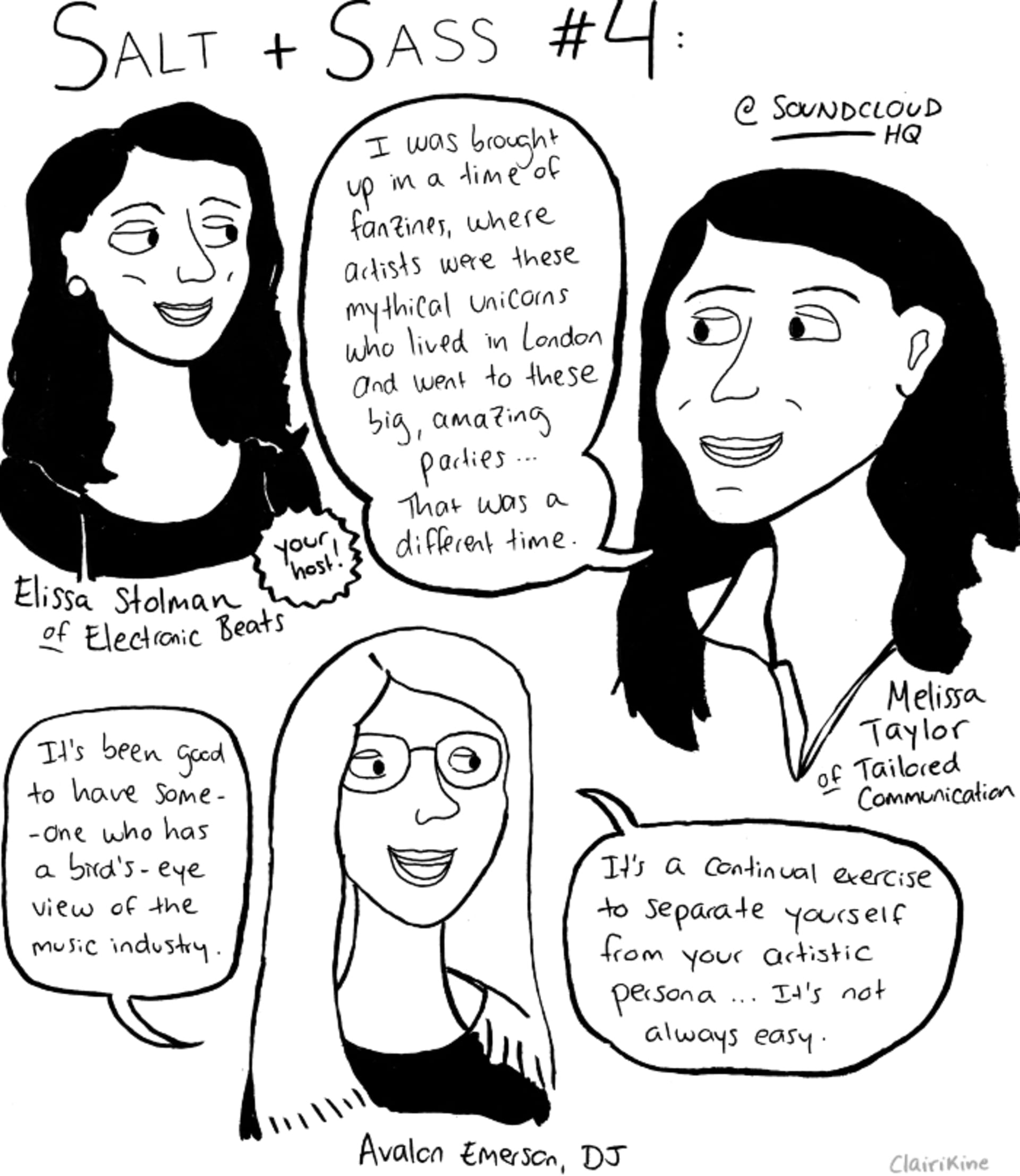
A DJ, A PR And A Writer Dissect The Music Media
EB has supported the subjects of our latest conversation for some time now. We’ve been explicit about our love of American producer/DJ Avalon Emerson via Covering Tracks features, EB Radio mixes and music video posts, but our work with Melissa Taylor isn’t as obvious to readers as Taylor works behind-the-scenes as a PR agent. It’s safe to say that she’s one of the most well-known PRs in underground electronic music, as her agency Tailored Communication has represented scores of artists, record labels and events such as XL Recordings, Ostgut Ton, R&S and Ghostly International, among countless others—including Avalon. The two have worked together since Emerson’s first EP in 2014, which means that Taylor (and Tailored) has played a vital role in building her client’s profile as a sought-after internationally touring DJ. But as Taylor explained at our recent conversation at Salt + Sass, a series that celebrates women in Berlin’s electronic music industry (and which we covered in our year-end list of important moments in feminism), things really picked up for Emerson after she decided to leave her software engineering job in San Francisco and move to Berlin to pursue a career in music.
https://soundcloud.com/electronic-beats-radio/eb-radio-presents-avalon-emerson
Elissa Stolman: Well, it makes sense to start this by having you guys introduce yourselves and telling us how you ended up here.
Melissa Taylor: I started working PR in London at a pop music agency called Slice PR. When I left I decided never to work with pop music ever again. I worked as a music journalist before joining Fabric when they started their CD series. After five years, there wasn’t really anywhere for me to go to within the company and I didn’t want to work for anyone else, so I decided to move to Berlin and start my own company. My agency Tailored began in London with a few clients like Ostgut Ton and Get Physical, and when I moved to Berlin I found many more. I offered cost-effective global PR representation with radio and club promo, which no other company was doing at the time. I also started to use streams and digital downloads, and that allowed me to do more online promotion while the established PR companies were still focused on print. At Tailored we’ve always focused simply on working with music we love. The team has changed over the years and now includes Alexa Gansera, who’s my partner alongside Marco Freivogel, as well as Rosalie De Meyer, Angelica Golten and Jenny Cheng, who are really committed and lovely women to work with.
Avalon Emerson: I worked as a full stack developer in San Francisco before I moved to Berlin, and that’s also what I do here. I’ve been living a double life, and lately it’s been pretty crazy. One of the most frustrating parts about it is that oftentimes both sides don’t get the other; at best it’s a misunderstanding, but at worst it feels like it negates what I’m doing in either my music or software career. However, having kind of a double life has afforded me some artistic liberties and relaxation in that I don’t have to catch every single remix or show that comes my way. I have more control over where I’m going because I feel like I’ve retained leverage over my artistic career. So far Tailored has handled press centered around an upcoming record. I’ve also had an ongoing working relationship with Tailored, so they handle opportunities that arise like Boiler Room or random interview requests.
MT: We’re able to look ahead for certain opportunities around things that might be missed if she didn’t have a PR. We can also plan the big picture for her. When Avalon moved to Berlin, we were able to set long-term goals and work on video content and that sort of thing to broaden her press.
ES: I’d like to get a general sense of what a PR agent’s job is and what they do for a DJ. When an interview with Avalon goes up online, what’s your role in making that happen?
MT: We’ll be reaching out, pitching the idea of doing the interview and perhaps a specific theme or topic that she wants to talk about. Then we’ll set it up, send all the information over to the writer and make sure that everyone’s happy with the result. And we’ll publicize it once it’s gone up.
AE: That second part, where Tailored helps to make sure everybody’s happy and gets clearance on a piece before it goes up, is one of the things I’ve really liked about having a PR agent—especially because I don’t have a manager. Working directly with you, Alexa and Rosalie has been key because I feel I can talk directly with you guys, and you can act as a buffer in case somebody misquotes me or paints a weird picture of me in an article.
MT: It can be hard when people approach an artist directly with press requests, because sometimes the person gets shitty about it if you say no. Also if an interview goes wrong and you’re not happy with the results, it’s good to have someone like me who can be the asshole or who can point the mistakes in a nice, fair way and get things fixed without it reflecting on the artist. It also doesn’t reflect on us, because then we’re like, “Well, I’m just doing my job.”
I think it’s especially important for female artists to have that buffer, because quite often the slant of the press for female artists is…the comments section will be shitty and you’ll need to get that moderated. Or they’ll write something stupid about how she’s dressed. You know what I’m talking about. So it’s actually good to have someone like me say, “You know guys, that’s really not appropriate. Can we all be serious here and sort it out?” I personally don’t think the artist should do that themselves because it can reflect negatively on you in the eyes of the press, whereas I’m happy to be the bitch.
AE: Sometimes the institutionalized misogyny is so deep that interviewers don’t even know they’re doing it at all. For instance, I remember I complained on Twitter about wasps in Berlin last year, and an interviewer was like, “If you could turn around tomorrow and eliminate one thing, which would it be: institutionalized sexism in the music industry or wasps?”
MT: What a choice!
AE: I’m thinking, “You’re directly shrinking this horrific system of societal violence to an insect; you’re literally comparing it to an insect.” Every question was like this. He thought he was being funny, and I said, “This is offensive.” To one of them I just responded with a picture of Beyonce surrounded by question marks. He was really embarrassed and said, “I’m so sorry—I didn’t realize.” You’ve gotta have a hand to knock them back sometimes, and having a publicist is really helpful with that.

ES: Have you ever done press without PR?
AE: Tailored has been there since day one, pretty much. I think when I was first beginning, I was more open to all different kinds of interviews, and now I’m choosier. As the stakes get higher and as more people are going to see whatever it is I do, I feel like I’m more involved with y’all. It’s also really important to bounce things off somebody who has a bird’s eye view of the industry and so many years of experience. It’s really hard and a continuous exercise to think of “Avalon Emerson” as a non-me, an external representation. It’s still super bizarre to do that in my mind and separate the egos, so it’s really awesome to be able to talk with somebody about that.
ES: Mel, what do you bring to the table with the artists you work with?
MT: We go beyond traditional PR in many ways. A lot of the advice and interest that we take in our artists’ careers is more—up to a point—management. We do advise and we do speak up and say when we think that something’s not appropriate. That’s not necessarily how people are used to working with a PR agency, because often you’re hired for a specific project and the price is right and you work with the label manager. But we often work directly with the artist, which makes our relationships with those artists and labels slightly different.
ES: Do you also think your work increases the volume of press that they get and therefore perhaps their bookings?
MT: I do think it increases their press, yes, and I do think good press has an effect on bookings. That’s why we work with a lot of bookers.
ES: Are there preemptive ways to manage how people portray Avalon rather than doing damage control after the fact?
MT: A lot of it has to do with presentation. It’s really important to me that people are given all the information that I think they need right at the beginning. I’m a real stickler for presentation and detail and I like everything to be perfect, right down to the press shots and images, because I think that fewer things go wrong that way. But things do go wrong, and we’re all relaxed about it. You can only hope that the artist is able to be portrayed in a way that they’re comfortable with, and the main way of doing that is focusing on the music. If you make it too much about the someone’s biography or their interests, that makes it more personality-driven, and essentially what we’re dealing with is music. That’s why I always listen to the music before I work with someone—which is not actually the industry standard.
ES: You’ve talked about how the press can treat women differently, and I’m wondering if that’s also reflected on your end of the process. Is working with female artists is different than working with male artists? Are you more careful about how you pitch them to publications?
MT: No. For me, it’s not an issue. Years and years ago I worked on the press for an album by DJ Chloé, an amazing French artist. When she did an RA podcast, I think the first ten comments were like, “Get your tits out!” I was absolutely appalled; I never imagined that would be peoples’ reaction to it. But it hasn’t changed how I present things or how I pitch to the press. It just makes me a bit cautious in the comments section and of social media.
AE: Internet rule number one: don’t read the comments. I have a question: over the past five years or so, have you seen a change in the PR process?
MT: Well, five years ago, if you sent a report to distribution and was full of online stuff, you’d probably get fired. The main distributors had absolutely no respect for online at all. Blogs were completely immaterial. It was difficult for us to get them to do good press online because it was badly viewed and everything was still geared toward print. When everything started going tits-up for print, obviously it changed. It’s actually nice because it can make things more immediate.
AE: The decline in the importance of print has put pressure on retweets and stuff, which is kind of a kneejerk reaction, as if it’s a direct measure of your return on your investment. “This got 42 retweets; that’s twice as good as something that got 21.” It’s really easy to flatten everything into that one dimension of shares, pageviews, clicks—whatever—but without contextual weight, it’s not an accurate measure of success.
MT: Nowadays if you go and visit a magazine or a website, they all have these screens on the walls with constant running stats of how many likes and how many shares a news story got and how many tweets something got and who replied to what. They’re under a different pressure now that they weren’t under before, and we don’t necessarily think about how that must affect editorial decisions they make what music they’ll represent and the way they’re able to engage with artists. They have a constant reminder of who cares about what and what their demographic is constantly flashing at them all day long and management leaning over their shoulders saying, “Your Kanye tweet got 50 likes, but this one only got two.” There’s not much a choice of what to cover when you’re chasing after that, is there?
AE: I really love data and statistics, don’t get me wrong. But it’ll be interesting to see if there will be an abandonment of this heavy dependence on one-dimensional “like” versus ignore KPIs. Hopefully we’ll get beyond it, but I think we have to hit the bottom before we start to climb out of the valley. And I don’t think we have yet.
MT: I’d like to think there will be. I’d like to think that people will realize that it’s destroying their own content from within and making things less interesting. A lot of sites are losing their unique tastes because they’re caring too much about what people think rather than what they think.
AE: Is there even a brain or an opinion that matters behind that retweet?
MT: Oftentimes not. Strong editorial is not something to be overlooked. I respect it when an editor rejects my pitch and I know it’s because they’ve thought about it and they have an idea about what they want to do. With my website I can see everyone who listens and clicks—thank you, Avalon, for building me such a lovely website. The worst is when you pitch someone three times, and two weeks later they’ll say no and they haven’t even listened to the music. That’s the only thing that really riles me these days. If you’re going to make a decision about whether you’re supporting an artist or whether you’re not going to cover them, at least listen to their bloody music first. Otherwise what are you basing your decisions on? The way they look? Or the way it’s perceived? Or how you think they fit in the scene? If you’re a music magazine, how about you actually base that decision on music? That’s the only thing that really gets me angry these days.
ES: Take it easy. There’s a lot of music to listen to!
MT: Ha! That’s the other thing. I know. I get like, 600 emails a day, and of those, there are 30 emails from people wanting us to represent the music. On the one hand, I kind of feel the journalists’ pain, but that’s why I think it’s important to only work on music we love, so that I can with confidence go to you and say, “You should listen to this because it’s good.” It’s not that somebody’s paying me to give it to you. I’ve listened to it and I’ve thought about it. If you listen to it and you don’t like it, even if you just skip through record like a DJ in a record shop does, that’s fine by me. But if you’re not even going to skip through…it makes me angry.
ES: As you pointed out, though, there’s pressure for writers to deliver high traffic and social media numbers, and it’s rarely or never coming from the writers; it’s directed at them from management. The way I feel about a piece of music is unfortunately and much to my chagrin not the most important consideration when it comes to determining what we’ll cover. That’s one of the reasons I don’t call myself a journalist, as you just did. Also, sometimes I don’t need to listen to music to know that I won’t like it. I know from the label or just from the genre that I won’t like it or it won’t fit with what we’re doing at Electronic Beats. I do listen to some PRs’ recommendations more than others, but there is not one agent—or magazine, or website or writer, for that matter—whose advice on what to listen or pay attention to I take unequivocally. Everyone has too many clients and releases for me to keep up with.
Anyway, I also wanted to talk a little about the Tailored website because it’s one thing that sets Tailored apart. I actually didn’t know that Avalon built it. Maybe Avalon can tell us what the website does.
AE: What doesn’t it do?
MT: It doesn’t make tea.
AE: That’s version two. Basically, you have an account on there if you’re a member of the press or a DJ or something. You log in, and then you view the upcoming releases on Tailored’s roster that are available to you. Those are rolled out at specific strategic times. Mel, you wanted to rebuild the website for a little while. I didn’t do the design; that came done and beautiful. I basically worked on the backend and on the statistics engine you were talking about so you can track who listened to something, who downloaded it, if they left a comment and how the automated reports look. Most of it is not public; it’s what the artists, labels and distributors see. It was really interesting to see that side of this industry that I’m as a product and a consumer in.
ES: It’s a funny reversal because you’re able to and value the ability to map out and quantify attention the same way traffic is tracked on a music website.
AE: The existence of statistics and data points per se doesn’t give them authority on its own. Working with this kind of thing gives me an inherent mistrust of it if read incorrectly. But a lot of people still would rather have complete faith in these numbers that are being thrown at them rather than dealing with the more difficult, subjective, and human judgments of quality.
Published March 25, 2016.

